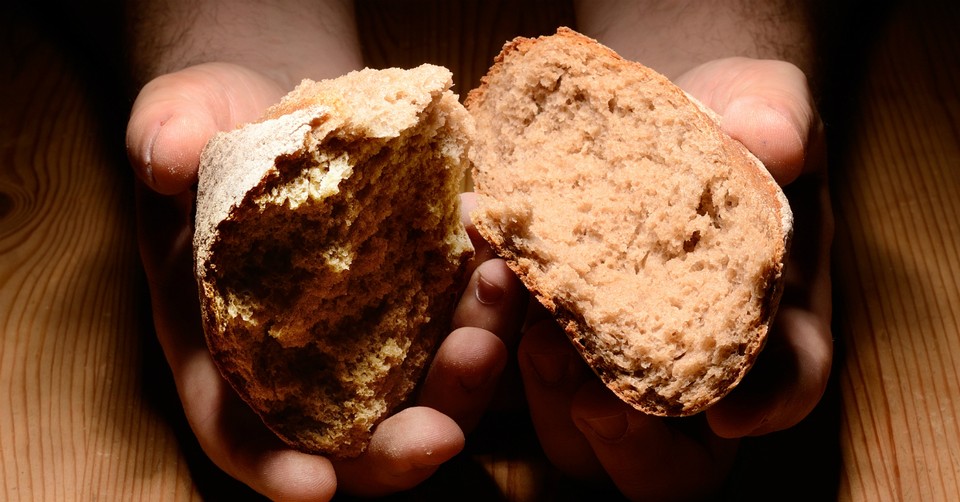What Can We Learn from the Bible Verses about the Breaking of Bread?

We often share about “the breaking of bread” at church, talking online, or writing a devotional. But what does the Bible tell us about the breaking of bread?
Does 'the Breaking of Bread' Refer Only to Eating Together?
Eating a meal with family, friends, and sometimes strangers is one way of experiencing fellowship. Sharing communion at different times and places is a way of remembering the broken body and blood shed by Christ for our sins.
During communion (also called the Eucharist), the prayer often speaks of the body of Christ being the bread and the juice or wine representing the blood of Jesus.
So, when we refer to the “breaking of bread,” do we only mean eating together? Or does the “breaking of bread” mean more than fellowship?
Where Does the Bible Talk about Breaking Bread Together as Fellowship?
The “breaking of bread” can mean eating a meal together or taking communion.
Eating a meal together frequently appears in the Bible because ancient Middle Eastern cultures prioritized hospitality. From Abraham welcoming three visitors (Genesis ) to Jesus was shown hospitality by Martha giving dinner to Jesus and the disciples (Luke 10:38), the Bible shows many examples of people inviting guests into their homes.
We see an element of this hospitality when Jesus sends out his disciples. Jesus had instructed the disciples not to take anything with them except a staff on their journeys. Others would meet any needs. The disciples depended on the hospitality of people they met on their journeys. People’s kindness supplied food, water, shelter, and clothing.
Jesus highlighted who ultimately provides when we have fellowship together. Each time Jesus ate or shared a meal with others, He thanked God.
When we talk about “the breaking of bread” that believers do, we see the deepest kind of hospitality: what God (as Jesus) gave for us.
When Does the Bible Talk about the Breaking of Bread?
When the Bible talks about the “breaking of bread,” it usually refers to Jesus’ sacrifice on the cross. His blood was shed, and His body was broken for our sins.
The New Testament book of Matthew shares about the breaking of bread: Jesus’ Passover meal with the disciples. This meal was not an ordinary one. Jesus broke bread with the disciples even while knowing one of them would betray Him.
“While they were eating, Jesus took the bread, and when he had given thanks, he broke it and gave it to his disciples, saying, “Take and eat; this is my body.” (Matthew 26:26 NIV)
“Then he took a cup, and when he had given thanks, he gave it to them, saying, “Drink from it, all for you. This is my blood of the covenant, which is poured out for many for the forgiveness of sins.” (Matthew 26:27-28 NIV)
The book of John tells us the message that Jesus gave when people disagreed He was from Heaven. As the Jews began to argue and complain about Jesus, they questioned how He could come down from Heaven if He was only the son of Joseph (John 6:42). Joseph was a carpenter and known as a “just man.” He was not famous or born with a high position. Therefore, some wondered how he could be the father of Jesus.
In response, Jesus calls Himself “the bread of life” (John 6:48). He explained that their ancestors ate the manna in the wilderness and died. The people had asked for food, yet Jesus was telling them that He was the food they needed.
“But here is the bread that comes down from Heaven, which anyone may eat and not die. I am the living bread that came down from Heaven. Whoever eats this bread will live forever. This bread is my flesh, which I will give for the life of the world.” (John 6:50-51 NIV)
How Did Jesus' Followers Practice the Breaking of Bread?
After Jesus ascended into Heaven, his disciples passed on what he modeled at the Lord’s Supper.
In Acts 2:42-47, we read that the people were devoted to the apostles’ teachings, fellowship, the breaking of bread, and prayer. They were participating in communion with others, breaking bread in their homes, eating together, and praising God.
Others besides the original apostles talked about communion’s importance. In the Apostle Paul’s letter to the church in Corinth, he discussed problems, including participating in idol worship some days and taking communion at church meetings.
“You cannot drink the cup of the Lord and the cup of demons, too: you cannot have a part in both the Lord’s table and the table of demons.” (1 Corinthians 10:21 NIV)
Paul told the people not to offer sacrifices to false idols because those sacrifices could be unknowingly offered to demons. Paul clarified that the problem was not eating the meat but the eater’s mindset. Sharing a meal with others was a special action, not only for physical nourishment but spiritual nourishment as well.
Breaking bread in Paul’s time held a significant meaning, especially for believers. Not only eating a meal together but also entering into communion with God.
“Is not the cup of thanksgiving for which we give thanks a participation in the blood of Christ? And is not the bread that we break a participation in the body of Christ?” (1 Corinthians 10:16 NIV)
Scholars state that Paul is saying that by eating the bread and drinking the wine, we are symbolically participating in the body and blood of Christ. Therefore, communion is a sacred action.
Why Should We Practice the Breaking of Bread Today?
The “breaking of bread” is as important today as it was in Paul’s time.
Eating the bread and drinking the grape juice or wine allows us to thank God for Jesus. During communion, we share our beliefs and love for God with other believers. The clergy often gives reminders before communion that remind us to be reflective and consider the death of Jesus and the promise that He will come again. Also, we can thank God for His provisions and His Son, Jesus Christ.
If a person cannot break bread with others for health or other reasons, the person may choose to take communion alone. There are times when clergy will take communion to shut-ins or hospital patients.
How Can We Break Bread in Fellowship Today?
Fellowship and hospitality also matter today. We can show hospitality by looking people in the eyes, listening to what they say, and sharing God’s love through our words and actions. These are all ways to show people God’s love.
Hospitality can bring people closer together and offer the opportunity to share God’s message through prayers and teachings of the Bible. In today’s world, families, friends, and sometimes strangers gather for meals in homes and other places.
In the Bible and today, hospitality is shown in many ways. From offering food to the hungry, shelter to the homeless, clothing to those in need, and other ways of sharing God’s love, hospitality can be a blessing to everyone. The fellowship of believers can be a path for others to know God.
How often have you shared a meal with others, and no blessing or prayer was spoken before eating? Perhaps a silent prayer was given. Maybe the people gathered were not used to praying and giving thanks before a meal. Or there may have been hesitation due to uncertainty of how others would look upon someone praying. Different reasons are given for not praying aloud before a meal. What is your personal choice? Pray aloud or silent? Pray together or separately?
Sharing a meal, taking communion together, reading Scripture during family time, attending worship, and volunteering in church and community are a few ways of showing hospitality. As Christians, we have the power of prayer and His love to help us when any doubts arise.
Whether we cook a meal and take to shut-ins, visit the elderly, pray for the sick, or provide for the less fortunate, we are showing God’s love.
10 Prayers to Practice the Breaking of Bread
- Father, we thank You for the Bread of Life, Jesus Christ. We thank You for the many provisions You provide. Help us to show Your love to others through the breaking of bread. Amen.
- Lord, thank You for ways to break bread with others. May each prayer we give bring others closer to You. Amen.
- Dear God, help us to know how to break bread with others. Give us the words to say and the confidence to speak boldly. Thank You. Amen.
- Lord, we thank You for Jesus. Help us to break bread with the homeless, the sick, the needy, the poor, and all of Your children. In His Name, Amen.
- Father, we ask for Your help in breaking bread. Help us to show hospitality to others. Give us the words to share and guide us to know the actions that will show Your love and glory. Amen.
- Abba Father, we thank You for Jesus, the Bread of Life. Help us to break bread with strangers. Give us courage and a heart filled with compassion. Amen.
- God, we need You. Help us to know how to break bread with others. Thank You. Amen.
- Lord God Almighty, You are the maker of Heaven and Earth. Please give us wisdom, discernment, and revelation on how to break bread with strangers. Amen
- Father, please help us to show hospitality even when our lives are busy and our minds are not in the right place. Change our hearts and help us remember the sacrifice given by You. Amen.
- Dear Lord, we give thanks to You for showing us how to love others through the breaking of bread. May we help others know You better. Amen.
In His Name,
Melissa Henderson
Photo Credit: ©GettyImages/Thomas Soellner

Melissa is the author of Licky the Lizard and Grumpy the Gator. Her passions are helping in the community and church. Melissa is an Elder, Deacon, and Stephen Minister.
Follow Melissa on Facebook, Twitter, Pinterest, and at https://www.melissaghenderson.
This article is part of our larger resource library of popular Bible verse phrases and quotes. We want to provide easy to read articles that answer your questions about the meaning, origin, and history of specific verses within Scripture's context. It is our hope that these will help you better understand the meaning and purpose of God's Word in relation to your life today.
"Be Still and Know that I Am God"
"Pray Without Ceasing"
"Fearfully and Wonderfully Made"
"All Things Work Together for Good"
"Do Not Fear"
Originally published December 06, 2023.




